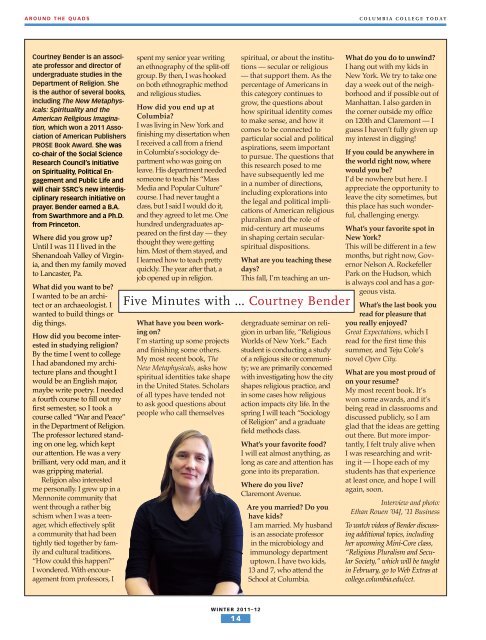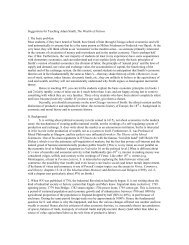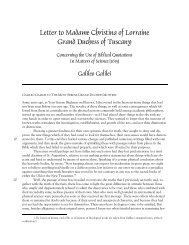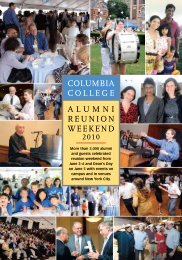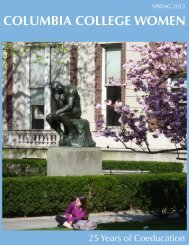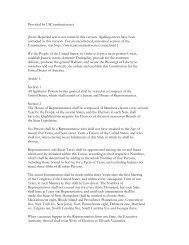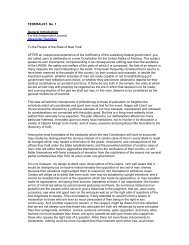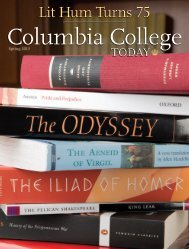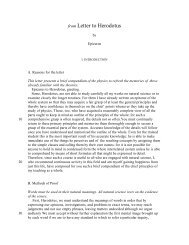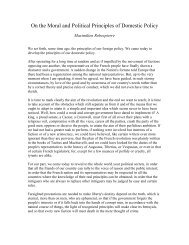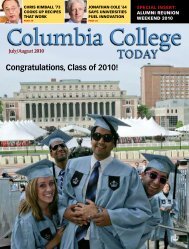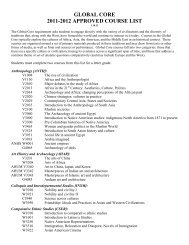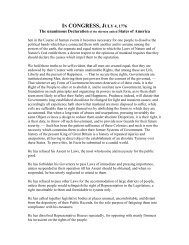Japan Storm - Columbia College - Columbia University
Japan Storm - Columbia College - Columbia University
Japan Storm - Columbia College - Columbia University
You also want an ePaper? Increase the reach of your titles
YUMPU automatically turns print PDFs into web optimized ePapers that Google loves.
AROUND THE QUADS COLUMBIA COLLEGE TODAY<br />
Courtney Bender is an associate<br />
professor and director of<br />
undergraduate studies in the<br />
Department of Religion. She<br />
is the author of several books,<br />
including The New Metaphysicals:<br />
Spirituality and the<br />
American Religious Imagination,<br />
which won a 2011 Association<br />
of American Publishers<br />
PROSE Book Award. She was<br />
co-chair of the Social Science<br />
Research Council’s Initiative<br />
on Spirituality, Political Engagement<br />
and Public Life and<br />
will chair SSRC’s new interdisciplinary<br />
research initiative on<br />
prayer. Bender earned a B.A.<br />
from Swarthmore and a Ph.D.<br />
from Princeton.<br />
Where did you grow up?<br />
Until I was 11 I lived in the<br />
Shenandoah Valley of Virginia,<br />
and then my family moved<br />
to Lancaster, Pa.<br />
What did you want to be?<br />
I wanted to be an architect<br />
or an archaeologist. I<br />
wanted to build things or<br />
dig things.<br />
How did you become interested<br />
in studying religion?<br />
By the time I went to college<br />
I had abandoned my architecture<br />
plans and thought I<br />
would be an English major,<br />
maybe write poetry. I needed<br />
a fourth course to fill out my<br />
first semester, so I took a<br />
course called “War and Peace”<br />
in the Department of Religion.<br />
The professor lectured standing<br />
on one leg, which kept<br />
our attention. He was a very<br />
brilliant, very odd man, and it<br />
was gripping material.<br />
Religion also interested<br />
me personally. I grew up in a<br />
Mennonite community that<br />
went through a rather big<br />
schism when I was a teenager,<br />
which effectively split<br />
a community that had been<br />
tightly tied together by family<br />
and cultural traditions.<br />
“How could this happen?”<br />
I wondered. With encouragement<br />
from professors, I<br />
spent my senior year writing<br />
an ethnography of the split-off<br />
group. By then, I was hooked<br />
on both ethnographic method<br />
and religious studies.<br />
How did you end up at<br />
<strong>Columbia</strong>?<br />
I was living in New York and<br />
finishing my dissertation when<br />
I received a call from a friend<br />
in <strong>Columbia</strong>’s sociology department<br />
who was going on<br />
leave. His department needed<br />
someone to teach his “Mass<br />
Media and Popular Culture”<br />
course. I had never taught a<br />
class, but I said I would do it,<br />
and they agreed to let me. One<br />
hundred undergraduates appeared<br />
on the first day — they<br />
thought they were getting<br />
him. Most of them stayed, and<br />
I learned how to teach pretty<br />
quickly. The year after that, a<br />
job opened up in religion.<br />
What have you been working<br />
on?<br />
I’m starting up some projects<br />
and finishing some others.<br />
My most recent book, The<br />
New Metaphysicals, asks how<br />
spiritual identities take shape<br />
in the United States. Scholars<br />
of all types have tended not<br />
to ask good questions about<br />
people who call themselves<br />
WINTER 2011–12<br />
14<br />
spiritual, or about the institutions<br />
— secular or religious<br />
— that support them. As the<br />
percentage of Americans in<br />
this category continues to<br />
grow, the questions about<br />
how spiritual identity comes<br />
to make sense, and how it<br />
comes to be connected to<br />
particular social and political<br />
aspirations, seem important<br />
to pursue. The questions that<br />
this research posed to me<br />
have subsequently led me<br />
in a number of directions,<br />
including explorations into<br />
the legal and political implications<br />
of American religious<br />
pluralism and the role of<br />
mid-century art museums<br />
in shaping certain secularspiritual<br />
dispositions.<br />
What are you teaching these<br />
days?<br />
This fall, I’m teaching an un-<br />
Five Minutes with … Courtney Bender<br />
dergraduate seminar on religion<br />
in urban life, “Religious<br />
Worlds of New York.” Each<br />
student is conducting a study<br />
of a religious site or community;<br />
we are primarily concerned<br />
with investigating how the city<br />
shapes religious practice, and<br />
in some cases how religious<br />
action impacts city life. In the<br />
spring I will teach “Sociology<br />
of Religion” and a graduate<br />
field methods class.<br />
What’s your favorite food?<br />
I will eat almost anything, as<br />
long as care and attention has<br />
gone into its preparation.<br />
Where do you live?<br />
Claremont Avenue.<br />
Are you married? Do you<br />
have kids?<br />
I am married. My husband<br />
is an associate professor<br />
in the microbiology and<br />
immunology department<br />
uptown. I have two kids,<br />
13 and 7, who attend the<br />
School at <strong>Columbia</strong>.<br />
What do you do to unwind?<br />
I hang out with my kids in<br />
New York. We try to take one<br />
day a week out of the neighborhood<br />
and if possible out of<br />
Manhattan. I also garden in<br />
the corner outside my office<br />
on 120th and Claremont — I<br />
guess I haven’t fully given up<br />
my interest in digging!<br />
If you could be anywhere in<br />
the world right now, where<br />
would you be?<br />
I’d be nowhere but here. I<br />
appreciate the opportunity to<br />
leave the city sometimes, but<br />
this place has such wonderful,<br />
challenging energy.<br />
What’s your favorite spot in<br />
New York?<br />
This will be different in a few<br />
months, but right now, Governor<br />
Nelson A. Rockefeller<br />
Park on the Hudson, which<br />
is always cool and has a gorgeous<br />
vista.<br />
What’s the last book you<br />
read for pleasure that<br />
you really enjoyed?<br />
Great Expectations, which I<br />
read for the first time this<br />
summer, and Teju Cole’s<br />
novel Open City.<br />
What are you most proud of<br />
on your resume?<br />
My most recent book. It’s<br />
won some awards, and it’s<br />
being read in classrooms and<br />
discussed publicly, so I am<br />
glad that the ideas are getting<br />
out there. But more importantly,<br />
I felt truly alive when<br />
I was researching and writing<br />
it — I hope each of my<br />
students has that experience<br />
at least once, and hope I will<br />
again, soon.<br />
Interview and photo:<br />
Ethan Rouen ’04J, ’11 Business<br />
To watch videos of Bender discussing<br />
additional topics, including<br />
her upcoming Mini-Core class,<br />
“Religious Pluralism and Secular<br />
Society,” which will be taught<br />
in February, go to Web Extras at<br />
college.columbia.edu/cct.


